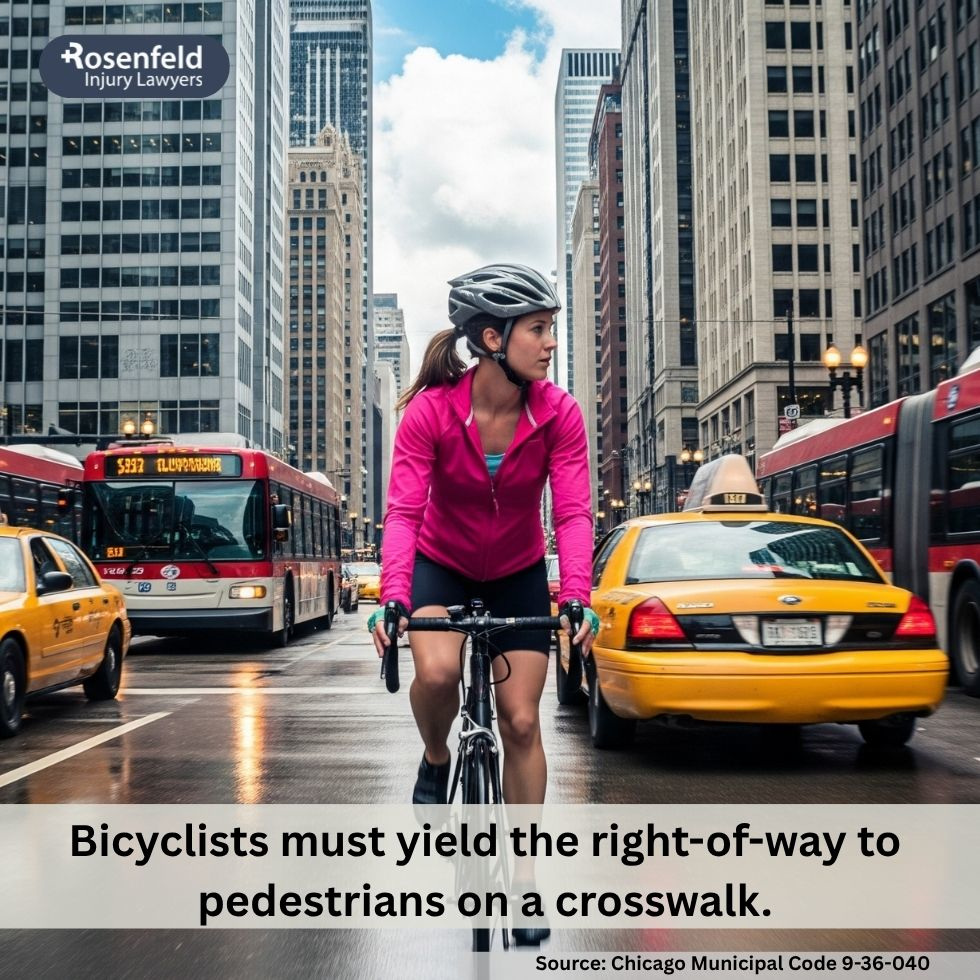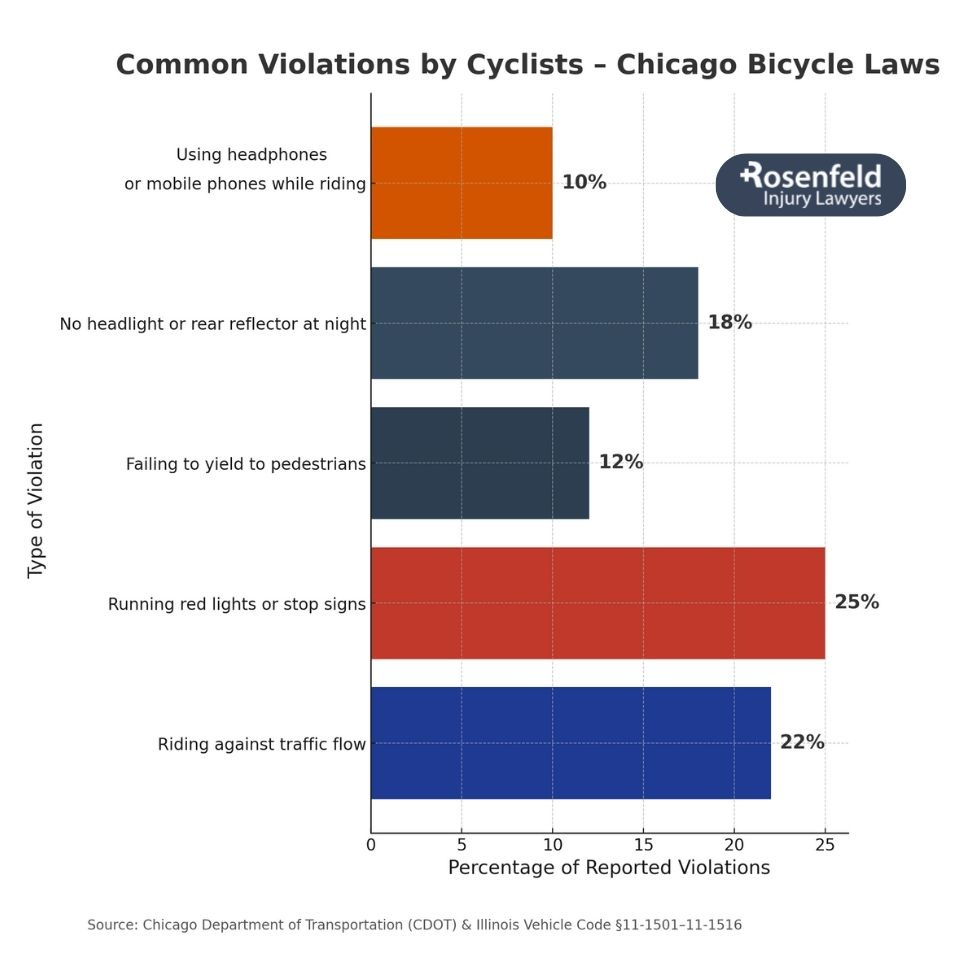- 24/7 Free Consultation: (888) 424-5757 Tap Here To Call Us
Chicago Bicycle Laws

Cyclists in Chicago must follow specific bike laws designed to promote safety and ensure smooth traffic flow. Chicago Bicycle Laws regulate bike lanes, right of way, traffic ordinances, and hand signals, outlining the responsibilities of persons riding bicycles and motor vehicle drivers. Understanding these laws helps prevent accidents and legal disputes.
Illinois State Laws Governing Bicycles
Illinois has specific bike laws that outline the rights and responsibilities of cyclists. These laws regulate where persons riding bicycles can travel, what equipment is required, and how cyclists must interact with motor vehicle drivers, pedestrian traffic, and other road users.
Bicycles as Vehicles: Rights and Duties Under Illinois Law
Bicycles are considered vehicles under Illinois law (625 ILCS 5/). This means cyclists have the same rights and responsibilities as motorists when riding on roadways or in marked traffic lanes. However, some exceptions apply, such as allowances for riding in bike lanes or on specific sidewalks where local ordinances permit it.
Required Equipment for Bicycles in Illinois
Illinois law (625 ILCS 5/11-1507) mandates that bicycles be equipped with certain safety features:
- Lights – A white front light visible from 500 feet and a rear red reflector or light visible from 200 feet when riding at night.
- Brakes – Bicycles must have a braking system capable of stopping within 25 feet at normal speed.
- Reflectors – Additional reflectors may be required on wheels and pedals for better visibility.

Riding on Roadways: Where Can Cyclists Ride in Illinois?
Illinois law (625 ILCS 5/11-1505) regulates where bicycle or vehicle proceeding rules apply:
- Cyclists must ride with traffic on the right-hand curb or edge of the road.
- Exceptions allow cyclists to take an entire lane in a substandard-width lane or to avoid fixed or moving objects and surface hazards.
- Cyclists should use designated bicycle paths and bike lanes where available.
- Riding on sidewalks is generally prohibited, but local authorities may allow exceptions, such as in areas without safe roads for cycling.
Traffic Laws Applying to Cyclists
Persons riding bicycles must follow traffic laws to ensure safety:
- Obeying traffic signals and signs – Cyclists must stop at stop signs and follow traffic codes applicable to motor vehicle drivers.
- Yielding the right-of-way – Cyclists must yield to such pedestrians at crosswalks and intersections.
- Signaling turns – Riders must use hand and arm signals, including extending the left arm horizontally for a left turn or the right arm for a right turn.
- Rules on passing – Cyclists must pass other vehicles and bikes in a manner that ensures safety.
Illinois Laws on Distracted Cycling
Illinois prohibits cyclists from using communication devices such as cell phones while riding unless using a hands-free option. Like drivers, distracted cyclists are at greater risk of accidents and may face penalties under state regulations for reckless cycling.
Illinois Laws on Cycling Under the Influence
While Illinois’ DUI laws primarily apply to motor vehicle drivers, cycling under the influence is still dangerous and discouraged. Cyclists impaired by alcohol or drugs can be cited under local ordinances for reckless behavior and, in some cases, held legally responsible for accidents.

Chicago-Specific Bicycle Ordinances (Municipal Code)
In addition to Illinois state laws, Chicago bicycle laws include local ordinances that regulate where cyclists can ride, how they must interact with traffic, and penalties for violations. Understanding these regulations helps persons riding bicycles stay safe and avoid fines.
Registration of Bicycles in Chicago
Bicycle registration is not legally required in Chicago, but the city encourages cyclists to register their bikes with the Chicago Department of Transportation (CDOT). Registration helps law enforcement recover stolen bicycles and return them to their owners.
Cyclists can register their bikes online or through participating bike shops. While optional, registering your bike provides additional protection if lost or stolen.
Where Can You Ride Your Bike in Chicago?
Chicago has specific rules regarding where persons riding bicycles are allowed:
- Bike lanes – Cyclists have the right to use bike lanes, but they must follow traffic laws and yield to pedestrian traffic at intersections. Motor vehicle drivers are prohibited from blocking designated bicycle paths or using them as parking spaces.
- Sidewalk riding restrictions in Chicago – Adults are generally prohibited from riding on sidewalks unless a sign permits it or the cyclist uses the sidewalk to reach a bike rack.
- Riding on the Lakefront Path and other multi-use trails – Cyclists must yield to pedestrian traffic and ride in a normal and reasonable movement to prevent accidents. Speeding or reckless riding may result in fines.
Chicago’s “Dooring” Ordinance
Chicago law prohibits motor vehicle drivers or passengers from opening a car door into the path of a cyclist. Under Municipal Code 9-80-035, violators face fines of $1,000 if they cause a crash and $300 for improper dooring. The city also requires “LOOK!” stickers in taxis and rideshares to remind passengers to check for cyclists before opening doors.
Rules for Carrying Passengers on Bicycles in Chicago
Chicago limits how cyclists can carry passengers to prevent unsafe riding conditions. Under city applicable traffic laws:
- A bicycle must have a properly installed passenger seat if carrying more than one rider.
- Children under four must be secured in an approved child carrier or trailer.
- Bicycle racing participants may carry passengers only under permitted event conditions.
Violating these regulations may result in fines and safety concerns.
Rules for Parking Bicycles in Chicago
Chicago law outlines specific bicycle parking rules to prevent obstructing sidewalks and pedestrian traffic. Cyclists must:
- Park their bikes at a bicycle share station, bike rack, or sign pole without blocking walkways.
- Avoid attaching bikes to parking meters unless no bike racks are available.
- Refrain from parking bicycles on Lake Shore Drive or near restricted areas marked by authorized signs.
Improperly parked bikes may be removed by local authorities.

Towing and Impounding
Bicycles can be towed or impounded by state or local authorities under the following circumstances:
- If left in a sidewalk area extending where they obstruct pedestrian traffic;
- If chained to trees, fences, or poles in violation of local ordinances;
- If abandoned for more than seven days in the exact location.
Cyclists must contact the city’s applicable agency to retrieve an impounded bike and may be required to pay a fine.
Penalties for Violations
Violating bicycle laws in Chicago can result in fines ranging from $50 to $500, depending on the offense. Common violations include:
- Ignoring stop signs or traffic signals;
- Riding in a manner that endangers pedestrians or vehicles;
- Failing to use required hand and arm signals.
A uniformed police officer may issue citations for violations, and repeat offenses may lead to increased penalties.
Motorist Responsibilities Towards Cyclists in Chicago

Motor vehicle drivers have a legal responsibility to operate safely and avoid causing harm to persons riding bicycles. Chicago bicycle laws outline specific rules drivers must follow to prevent accidents and protect cyclists.
- Drivers must exercise caution and avoid reckless behavior that could endanger cyclists. Failure to follow traffic laws and engaging in distracted or aggressive driving can result in liability if a bicycle accident occurs.
- Cyclists have the right of way in many situations, including when traveling in bike lanes or designated bicycle paths. Drivers must yield when making turns, entering intersections, or crossing marked bicycle routes.
- Illinois law requires drivers to leave at least three feet of space when passing a cyclist. If the lane is too narrow to pass safely, drivers must wait until it is safe rather than forcing the cyclist into a substandard-width lane or onto the sidewalk.
- Opening a car door into a cyclist’s path can cause serious injury. Under Chicago’s dooring ordinance, drivers and passengers must check for approaching cyclists before opening a door into the roadway. Violators may face fines up to $1,000 if a crash occurs.
- Drivers turning right must check their mirrors and blind spots to avoid cutting off cyclists in marked traffic lanes. Left-turning drivers must yield to oncoming cyclists proceeding in the opposite direction before completing their turn.
Secure Expert Legal Counsel!
If you were injured in a bicycle accident due to a negligent motor vehicle driver or unsafe road conditions, Rosenfeld Injury Lawyers is here to help. Our experienced Chicago bicycle accident attorneys understand the city’s bicycle laws and fight for injured cyclists to recover medical expenses, lost wages, and pain and suffering.
We know how to deal with insurance companies and hold the at-fault party accountable. Whether your case involves a dooring accident, failure to yield, or reckless driving, our legal team will work to secure fair compensation for your injuries.
We offer a free consultation and work on a contingency fee basis, meaning you pay nothing unless we win your case.Call us at (888) 424–5757 or fill out our contact form to speak with a dedicated bicycle accident attorney today.
All content undergoes thorough legal review by experienced attorneys, including Jonathan Rosenfeld. With 25 years of experience in personal injury law and over 100 years of combined legal expertise within our team, we ensure that every article is legally accurate, compliant, and reflects current legal standards.







